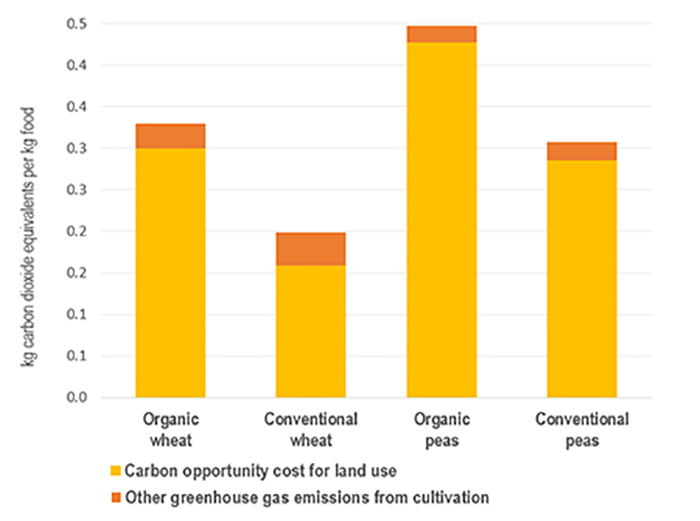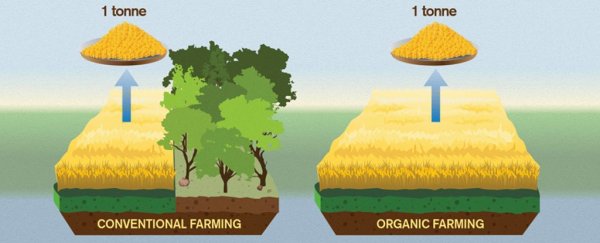Organic farming aims to maximise the 'natural' and minimise chemical interference when it comes to producing our food, but is it actually better for the environment?
A new study looking at pea and wheat crops suggests the opposite, claiming that organic farms are worse for the climate, because they tend to take up more room.
That means more deforestation, and less carbon getting pulled out of the air and stored in the ground, conclude the international team of researchers.
But to be clear, this research was limited to a couple of crops in just one region, so it's way too soon to make any broad sweeping statements about the entire industry.
For their study, the team of scientists focused on the farming of organic peas and wheat in Sweden.
Primarily because no fertilisers are used, organic pea farming takes up more space than non-organic pea farming, and that can be a problem – depending on how that land would otherwise get used.
 (Chalmers University of Technology)
(Chalmers University of Technology)
"Our study shows that organic peas, farmed in Sweden, have around a 50 percent bigger climate impact than conventionally farmed peas," says one of the researchers, Stefan Wirsenius from Chalmers University of Technology in Sweden.
"For some foodstuffs, there is an even bigger difference – for example, with organic Swedish winter wheat the difference is closer to 70 percent."
The team developed a "carbon opportunity cost" metric for assessing the carbon footprint of certain types of land use, charting carbon dioxide emissions against how much food is produced. For organic farms, that ratio lags behind non-organic farms.
Few previous studies have considered how carbon storage in vegetation and soil affects the environmental impact of organic farming, according to the researchers.
There's likely to be a knock-on effect for organic meat and dairy products too, the study points out, because these animals are fed with organic food – grown on farms that take up more room.
However, the study didn't look at meat and milk in any detail, so that's just a hypothesis for now. It's also worth pointing out that the researchers also mention the benefits of organic farming too – improving animal welfare and working towards a more sustainable type of farming, with minimal energy use.
And the team isn't suggesting organic farming should be shut down at the earliest opportunity – rather that its use should be carefully considered.
That consideration could extend to biofuels too, which also need more land to produce than conventional fuels.
"The type of food is often much more important," says Wirsenius. "For example, eating organic beans or organic chicken is much better for the climate than to eat conventionally produced beef."
"Organic food does have several advantages compared with food produced by conventional methods… but when it comes to the climate impact, our study shows that organic food is a much worse alternative, in general."
The study also mentions that eating pork, chicken, fish and eggs have a substantially lower impact on the environment than eating beef or lamb.
With so many factors involved in food production and its impact on the environment, it can be hard to separate myth from fact when it comes to organic farming.
But the more hard data we have on the advantages and disadvantages of this sustainable approach to agriculture, the better informed our decisions can be.
The issue is particularly topical in Sweden, with the government pushing for an expansion in organic farming. These policy decisions have an impact on the climate across the globe, the researchers point out.
"The greater land-use in organic farming leads indirectly to higher carbon dioxide emissions, thanks to deforestation," explains Wirsenius.
"The world's food production is governed by international trade, so how we farm in Sweden influences deforestation in the tropics. If we use more land for the same amount of food, we contribute indirectly to bigger deforestation elsewhere in the world."
The research has been published in Nature.
